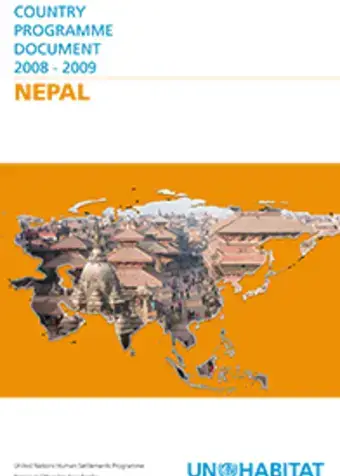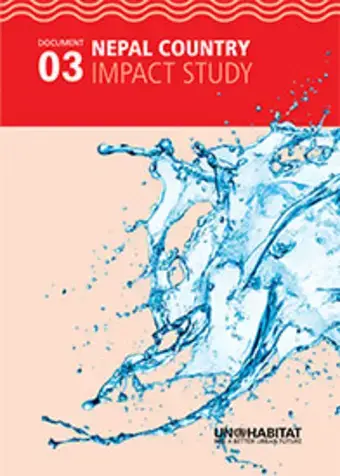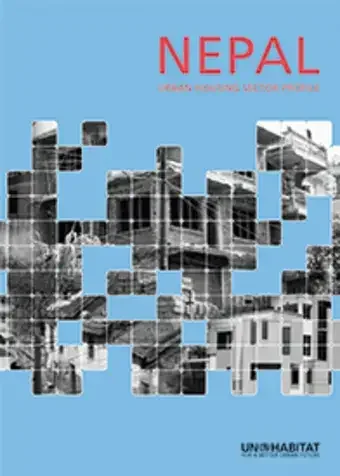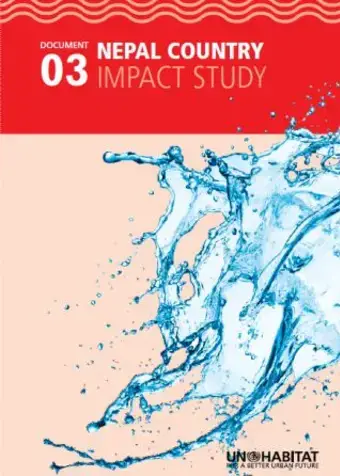 Kathmandu, 13 May 2015 - In the wake of the earthquake that took place on 25 April in Nepal, the Government of Japan has decided to support UN-Habitat’s humanitarian response for shelter provisions prior and during the forthcoming monsoon.
Kathmandu, 13 May 2015 - In the wake of the earthquake that took place on 25 April in Nepal, the Government of Japan has decided to support UN-Habitat’s humanitarian response for shelter provisions prior and during the forthcoming monsoon.
UN-Habitat ready to support Shelter, WASH and Early Recovery in Nepal
Nairobi 30 April 2015— The United Nations has released the Flash Appeal for Response to the Nepal Earthquake, appealing for USD 415 million for the first three months. For the preparation of the emergency appeal, UN-Habitat collaborated with the Shelter, WASH and Early Recovery clusters.
In this decade UN-Habitat support to Government and people of Nepal is primarily focused on four sectors: Urban Planning, Housing, and climate change, Land, Water, Sanitation, and Hygiene (WASH) and Disaster.
Impact
Urban numbers
Challenges
Nepal is one of the fast urbanizing countries in South Asia. Haphazard and unplanned urban sprawl have contributed to the growth of slums and informal settlements, inequalities, and inadequacy of basic services including housing, water and sanitation facilities. Unjust land tenure and ineffective land management are further challenges to shared prosperity and development. The pressures of urbanization on natural and cultural resources and assets are huge. Development gains are at risk of recurrent disasters.
As a landlocked and least-developed country, with a fairly recent legacy of civil war and significant outbound migration, Nepal nonetheless promulgated a federal constitution and set into motion devolution to local governments. The call for transformative commitments of the New Urban Agenda is of strong relevance to Nepal, with regard to ending poverty in urban and rural settlements, increasing spatial inclusion, promoting a productive urban economy that provides opportunities to children and youth and creating safe, green, healthy and resilient places for all people.
Donors and partners
UN-Habitat works in partnership with different partners like Government Ministries, municipalities and local authorities, NGOs/ CBOs and academia. Nepal programme has also joined with Global Land Tool Network (GLTN), Water Supply and Sanitation Collaborative Council (WSSCC).
Contact
Legacy content
- Total value of UN-Habitat investments (2008-2015) : US$ 14, 890, 629
- Total number of UN-Habitat projects (2008-2015): 16 projects
- Main donors: European Union, Government of Japan, Multi Donor Trust Fund (MDTF), Global Sanitation Fund (GSF) UN Central Emergency Response Fund (UN-CERF), United Nations Peace Fund for Nepal (UNPFN)
- Implementing partners: other UN agencies such as UNICEF and UNDP; IOM. Municipalities, local and international NGOs including Lumanti, CIUD, ENPHO and many others.
General information
Nepal is one of the least urbanized countries in South Asia at 18.2% but one of the fastest urbanizing, with a national urbanization rate (average annual change of the percentage urban, 2010-2015) of 2%. Being in the global list of Least Developed Countries the country is overwhelmed by urbanization challenges due to haphazard and unprecedented urban growth. The cities of Nepal are facing many problems indicating to an unsustainable urban future. Kathmandu valley is the single largest urban centre in Nepal encompassing more than half of the urban population.
The Gorkha Earthquake of 2015 which killed more than 8000 people, further exacerbated problems, brought about huge economic losses, structural damages, setting the countries’ development back at least a decade.
With recent addition there are 217 municipalities in Nepal. The failure of rural economy, the insurgency that took place in the country for 10 years and elongated political transition has moved large number of people from villages to cities. One of the major challenges Nepal is facing is the sustainability of urbanization as lack of effective planning and growing infrastructure demands. The political situation remains in a state of turmoil in the absence of local elections for more than decade, affecting municipal governance.
In addition to its fragile political environment and unabated population growth Nepal remains one of the vulnerable countries in the world owing to the climate change and environmental issues. The average annual temperature rise by 0.060C and frequent erratic rains is having impacts on livelihoods and economy of the country.
In this regard, UN-Habitat’s activities have been focused to supporting the government to target Nepal’s urbanization, climate change issues, environment and sanitation, shelter as well as land issues by targeting stakeholders, policy makers, civil society and as well as empowering urban poor for securing a better urban future in the country.
UN-Habitat projects in Nepal
UN-Habitat has been supporting the government of Nepal and its people since the 1980’s in various areas of human settlements and urban development. It established its office in Kathmandu in 2006, and provides support in the areas of water and sanitation, shelter and land, slum upgrading, green development climate change and urban mobility through the following projects:
Shelter Provisions for Most Vulnerable House-holds before and during Monsoon (2015-2016):
Shelter support for vulnerable households through the ‘Peoples Process’ for 5 Earthquake affected districts of Nepal- Kathmandu, Lalitpur, Bhaktapur, Sindhupalchowk, Dalakha, supported by the Government of Japan. More than 2,200 families were provided with temporary shelter provisions. Technical support is provided for safer construction and helped the communities in safer building of temporary shelters.
Nepal Earthquake Emergency Response (2015 – 2016)
After the 25 March 2015 earthquake, UN-Habitat surge specialists supported the IFRC Shelter Cluster lead and the formulation of the Post Disaster Needs Assessment. It provided an early assessment for the policy response in the Kathmandu Valley and the capital city. Thereafter, together with IOM, UN-Habitat took over the coordination of the shelter organisations, with the Government and IOM, in collaboration with DFID and SDC, in order to maximize winter assistance and preparations towards the reconstruction. UN-Habitat's sanitation programme also mobilised support for the WASH sector.
Urban Land, Legislation and Governance: Catalytic Support to Land Issues (2013-2015):
Under UN Peace Fund for Nepal (UNPFN) this initiative is supporting the government in its land management and land use planning to mitigate land related conflicts in association with UNDP and IOM. The project will implement pilot initiatives in three selected VDCs of Surkhet, Nawalparasi and Morang districts.
Empowering Women 4 Women: Access to Land for Sustainable Peace in Nepal (2015-2016)
This initiative is the continuation of the Catalytic Support to Land Issues project, focusing on women land holding and ownership. This project will empower women by helping to increase the ownership of women on land as women land holding in the country is minimal.
Urban Planning and Design: Green Homes – Promoting Sustainable Housing in Nepal (2013-2015)
With the financial assistance of EU, UN-Habitat is promoting environment friendly, green products and services in housing sector to reduce green house gases, promote green jobs thereby reduce urban poverty. The main target groups/beneficiaries of the project are national policy makers (MoUD and DUDBC), municipalities, SMEs involved in sustainable housing, poor urban youth, particularly women, consumers of sustainable housing, professionals, researchers and general public and partner organizations. This initiative is primarily focused in three municipalities viz. Pokhara, Lalitpur and Dharan. Helping the government to bring green building code, promotional policies of municipalities to encourage construction of green homes and availability of green model and services.
Revitalizing Kirtipur: Promoting People-entric Pond and Public Space Management (2013-2016)
Conserving the open spaces and its best utilization in the changed urban context is vital to safeguard such spaces against competing urban uses. It is important to bring people on board to protect and use these spaces. Under this project UN-Habitat is helping local community and municipality for the conservation of traditional open spaces and its better use.
Continuity to this initiative public space improvement work will be implemented in 2016 under this initiative.
Urban Basic Services: Global Sanitation Fund (2010-2017)
The GSF program in Nepal aims to help the Government achieve the National Goal of universal sanitation coverage by 2017 with focus on achieving Open Defecation Free (ODF) status and promoting hygiene behaviors. The coverage of the programme has been extended to 17 districts. By doing so, it contributes to progress towards the Millennium Development Goals (MDGs), especially those to reduce child mortality (Goal 4) and to ensure environmental sustainability (Goal 7).
People-entred Mobility (2013)
UN-Habitat is providing technical support to civil society and the government in promoting people-centred mobility. Promotion of non-motorized vehicles, public transportation, pedestranization are some of the areas covered.
Housing and Slum Upgrading: Operational Policy Guidelines for Urban Informal Settlements (2013)
UN-Habitat helped Government of Nepal to draft the policy guidelines to address the shelter need of informal settlements.
Support to Urban Poor Housing with Cooperative Financing (2013-14)
Under the request of the government UN-Habitat provided technical support to develop guidelines on promoting cooperative financing to cater the shelter need of low income group in cities.
Priority Action for Life-Saving Response through Integrated Nutrution, WASH and Health Interventions - (2012)
Building Back Safer early recovery pilot project for Sihara - (2012 - 2013)
Integrated Shelter Assistance for 225 Landless Households Affected by the Koshi Floods- (2009-2011)
The Provision of Vocational Training for Returning IDPs Affected by the Koshi Flood Priority (2009)
Non-Food Items and Emergency Shelter Assistance to IDPs and Returnees Induced by Conflict (2008) - CERF
Risk Reduction and Rehabilitation (Ongoing)
UN-Habitat with its mandate and being the co-lead of Shelter Cluster under IASC is leading and supporting the government in networking and preparing for shelter need as a recovery.
Contacts
Mr. Padma Sunder Joshi Habitat Programme Manager for Nepal UN-HABITAT P.O. Box 107 Pulchowk Lalitpur, Nepal Tel: + 977 1 5542816 Fax: + 977 1 5539877 unhabitat.nepal@unhabitat.org.np www.unhabitat.org.np



